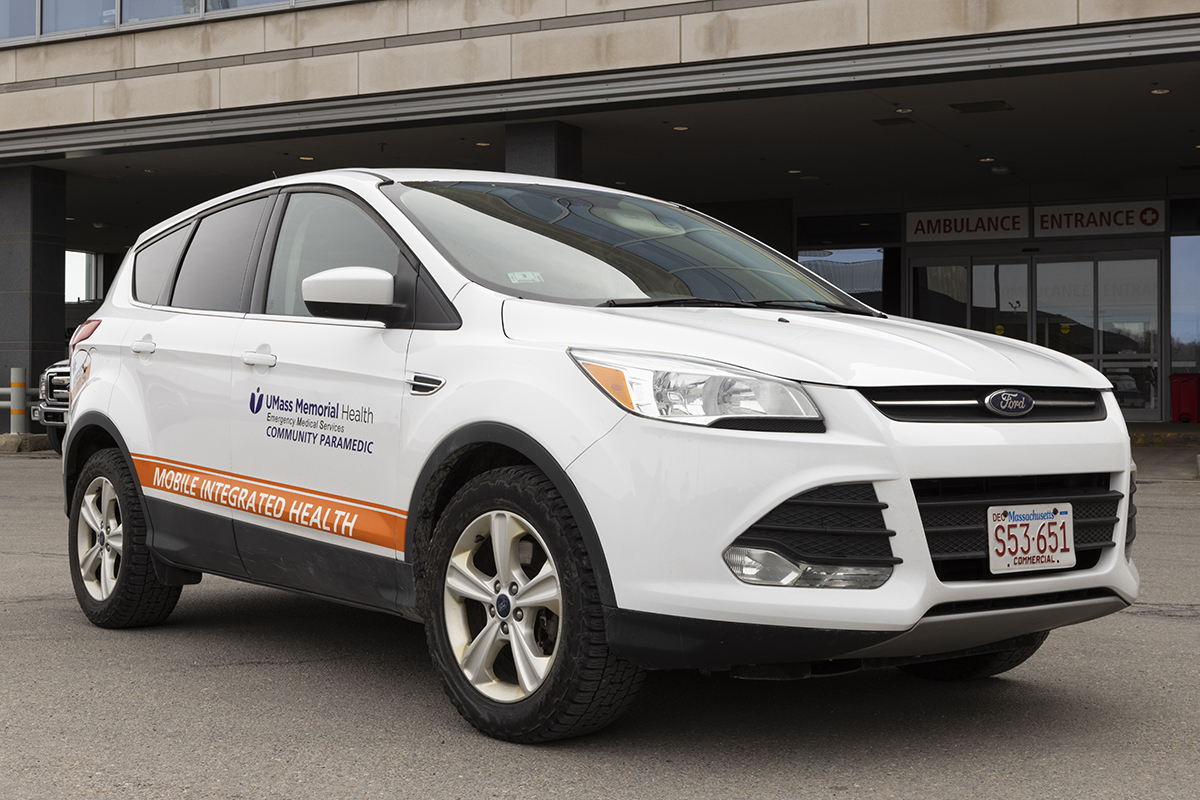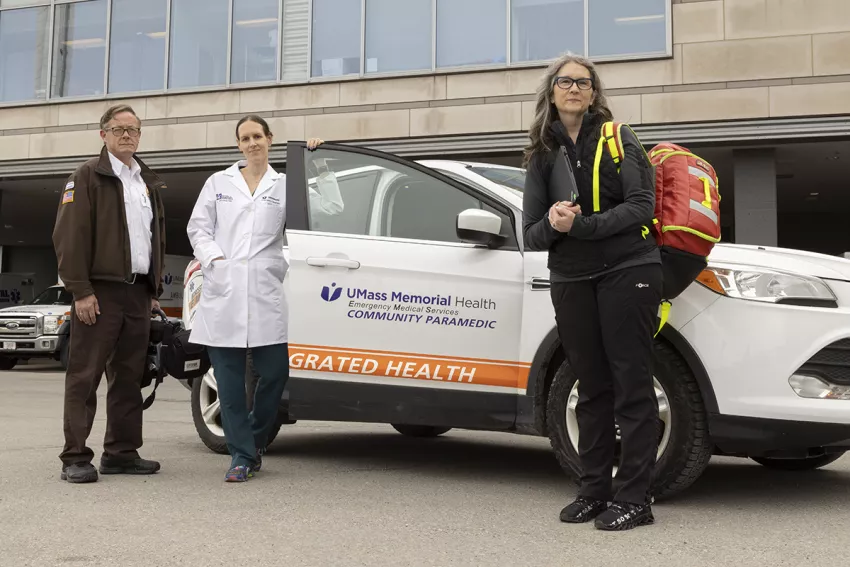Photo above: Members of the Mobile Integrated Health team at the ambulance bay at UMass Memorial Medical Center – University Campus. From left to right: Norman Soucie, Laurel O’Connor, MD, and Julie Inzerillo (Photo credit: Matt Wright).
A novel approach to coordinating care is helping UMass Memorial Health and other health systems reduce unnecessary medical care costs, improve quality and ease overcrowding in emergency departments (EDs) and ambulatory clinics.
Mobile Integrated Health (MIH) programs partner emergency medical services (EMS) agencies with providers to deliver care to patients in their homes, increasing convenience and safety for the chronically ill.
The concept for MIH developed in the late 1990s when EMS agencies began exploring partnerships with hospitals, physicians and nursing homes to treat chronic conditions “in place” to reduce unneeded ED transports and save doctors’ time and resources. Since then, varying models of MIH have developed throughout the country.
“The issues of overuse of emergency services and associated rising cost for care have been growing over time, but they really got to a tipping point for us at the height of the COVID-19 pandemic,” said Laurel O'Connor, MD, FACEP, emergency medicine physician at UMass Memorial Health and Assistant Professor of Emergency Medicine, UMass Chan Medical School.
Implementing During COVID-19
Providers at UMass Memorial began thinking about an MIH program at the height of the COVID-19 pandemic when patient capacity issues were “worse than they've ever been in terms of ED and hospital overcrowding and patients unable to see their primary care physicians,” said O’Connor.
At the same time, the Massachusetts Department of Public Health (DPH), recognizing the capacity issues hospitals were struggling with, took steps to facilitate quicker licensing of MIH programs in the state.
“They tore down all the red tape and made the process much more streamlined,” said O'Connor. “And they made licensure free when it previously cost upwards of $30,000.”
With external barriers minimized, UMass Memorial’s EMS division approached UMass Memorial Medical Center hospital leadership with a proposal for creating an MIH program.
“Once hospital leadership approved our proposal, DPH was very helpful and expedited licensure,” O’Connor said. “We went from concept to building an infrastructure in two or three weeks.”
Starting Small – Growing Quickly
The pilot program began in June 2021 with one paramedic and 30 hand-selected patients from the UMass Memorial Health Accountable Care Organization (ACO).
“We chose them because they were frequent users of emergency services,” O'Connor said. “We thought we could potentially change their health care patterns by offering them care in their homes.”
Within a few months, additional ACO patients were enrolled, and they opened the service to the entire ACO patient population shortly afterward. Along with growth came the addition of diagnostic services like mobile x-ray, ultrasound and the ability to collect and process bloodwork.
Clinics were next. The program now collaborates with Worcester Internal Medicine/Geriatrics, a UMass Memorial-affiliated primary care clinic that cares for a significant number of older adults living in the Worcester community. The program also collaborates with UMass Memorial Medical Center’s palliative care, colorectal, heart failure and pulmonary clinics.
By March 2023, the program had completed 130 calls with more than 90 discrete patients.
New Skills and Opportunities for Paramedics
Since its modest beginning, the program has expanded to include four full-time paramedics providing care 24 hours a day, 7 days a week. The growth has provided professional development and career-extending options in a field that has been known as a “strong back” job.
“In this role, paramedics are not pushing stretchers or carrying people downstairs,” said Norm Soucie, Chief of Emergency Medical Services for the Medical Center. “The program provides the opportunity to provide high-level paramedicine without the physical component.”
MIH also provides a deeper level of satisfaction for paramedics.
“When you’re on the ambulance, you’re focused on one problem with one solution. It’s very chaotic and there is not much time to spend with a patient due to the emergent nature of the situation,” said paramedic Julie Inzerillo. “With MIH, we now have time to work with patients one-to-one in the comfort of their own home. This allows us to deliver a truly patient-centered care experience that’s so unique.”
Paramedics received additional training to develop skills for services they don’t necessarily provide in the general EMS environment, such as antibiotic administration. They also needed to develop competency using the health system’s electronic medical record, Epic, since EMS services use a different charting program.
“UMass Memorial Medical Group and hospital nurses were integral in providing our paramedics with the additional training they needed,” Soucie said.
Physician and Patient Satisfaction
Early keys to the program's success were communicating with physicians and integrating with Epic.
“We've made a point of having exceptional communication with our physician partners and worked to provide the types of services they want for their patients,” said O'Connor. “We work with them to build our visits around the patients' needs.”
“Patients and their families are beyond grateful for this program,” Inzerillo said. “They are often surprised at the level of clinical care and expertise we are able to provide.”
The Anatomy of an MIH Visit
MIH visits are activated in one of three ways: through the patient, by an ambulatory provider who is concerned about a patient or upon discharge for a monitored patient who needs close follow-up.

A communications specialist takes the call on a dedicated MIH hotline and dispatches the MIH paramedic to the patient's home. The paramedic records the patient’s medical history, performs a physical examination and initiates a telehealth consultation with a physician.
“For some visits, the paramedic connects with an ED physician,” said O'Connor. “But some of our clinics know their patients very well or have patients with very specific needs. In those cases, the paramedic will contact the physician, nurse practitioner or physician assistant from the clinic.”
After the consultation, the paramedic will render care at home or, as a last resort, transport the patient to the ED. All orders and diagnostics are entered directly into the patient's Epic record to ensure continuity of care.
“It took us five months to get the Epic build,” O'Connor said. “But it enables us to have a truly integrated system that allows paramedics to execute orders and document exam findings and diagnostics results, and the entire visit is on record for the physician.”
Paying for Innovative Services
Public and private health insurance has yet to catch up with this new model of care. Until this point, institutional grants have covered MIH visits, making them cost-free for patients.
O'Connor added that UMass Memorial is not currently charging professional fees for telehealth visits. They are also working with other partners to make the program more sustainable.
Breaking Down Health Care Silos
An additional benefit of MIH is the potential for breaking down silos between departments and specialties.
“It's rare that I speak with a primary care physician,” said O'Connor, “but the reason MIH works is that we have developed such strong integrated communications between sub-specialties that we can work with the medical home to help patients access the right level of care for their acute needs.”
“I think if we could bring that seamless communication to more aspects of medicine, we would do very well.”
View more stories of healing, advancing medicine and innovating from UMass Memorial Health.


